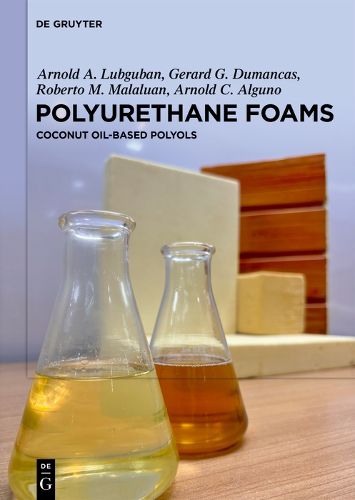Readings Newsletter
Become a Readings Member to make your shopping experience even easier.
Sign in or sign up for free!
You’re not far away from qualifying for FREE standard shipping within Australia
You’ve qualified for FREE standard shipping within Australia
The cart is loading…






As global priorities shift towards sustainable resources, there is a growing interest in alternatives to petroleum-based raw materials for industrial polyurethane (PU) foam production. Polyurethane foams (PUFs), produced from the reaction between a polyol (a polymer with multiple hydroxyl groups) and a diisocyanate, are widely used for their versatility. They range from flexible foams, like those found in mattresses or furniture, to rigid foams used for home insulation. The market for PU foams is anticipated to grow due to rising demand for comfort. Historically, petroleum-based polyols have been favored for their availability and versatility. However, as petroleum supplies dwindle, with oil reserves projected to be exhausted by around 2052, the pressing need for sustainable alternatives is clear to sustain the PU industry. Bio-based substitutes, such as polyols derived from palm, soybean, castor, and sunflower oils, have been extensively researched to replace the petroleum-based polyol feedstock. This book focuses on applying coconut oil-derived polyols in polyurethane foam production, offering a detailed examination of their potential benefits and associated difficulties. The introductory chapter outlines the critical need for greener alternatives and emphasizes the significant role of coconut oil as a substitute for petroleum-based polyols. Subsequent chapters delve into the chemistry and synthesis of coconut oil-derived polyols and polyurethanes, providing insights into their properties and contributions to polyurethane formulations. This book further provides an overview of how coconut oil's high saturation impacts the polyol production process and explores methods to overcome these challenges. It bridges the gap between raw material science and practical applications using coconut oil in polymer studies. It provides valuable information for researchers and industry professionals aiming to innovate with sustainable polymer materials.
$9.00 standard shipping within Australia
FREE standard shipping within Australia for orders over $100.00
Express & International shipping calculated at checkout
As global priorities shift towards sustainable resources, there is a growing interest in alternatives to petroleum-based raw materials for industrial polyurethane (PU) foam production. Polyurethane foams (PUFs), produced from the reaction between a polyol (a polymer with multiple hydroxyl groups) and a diisocyanate, are widely used for their versatility. They range from flexible foams, like those found in mattresses or furniture, to rigid foams used for home insulation. The market for PU foams is anticipated to grow due to rising demand for comfort. Historically, petroleum-based polyols have been favored for their availability and versatility. However, as petroleum supplies dwindle, with oil reserves projected to be exhausted by around 2052, the pressing need for sustainable alternatives is clear to sustain the PU industry. Bio-based substitutes, such as polyols derived from palm, soybean, castor, and sunflower oils, have been extensively researched to replace the petroleum-based polyol feedstock. This book focuses on applying coconut oil-derived polyols in polyurethane foam production, offering a detailed examination of their potential benefits and associated difficulties. The introductory chapter outlines the critical need for greener alternatives and emphasizes the significant role of coconut oil as a substitute for petroleum-based polyols. Subsequent chapters delve into the chemistry and synthesis of coconut oil-derived polyols and polyurethanes, providing insights into their properties and contributions to polyurethane formulations. This book further provides an overview of how coconut oil's high saturation impacts the polyol production process and explores methods to overcome these challenges. It bridges the gap between raw material science and practical applications using coconut oil in polymer studies. It provides valuable information for researchers and industry professionals aiming to innovate with sustainable polymer materials.